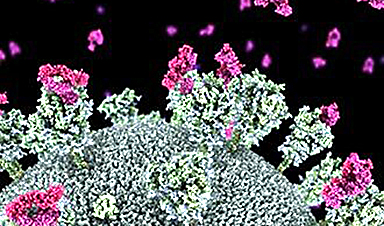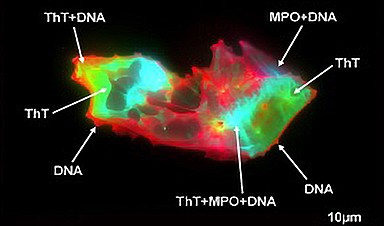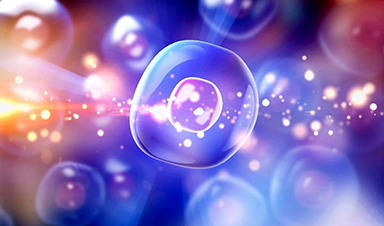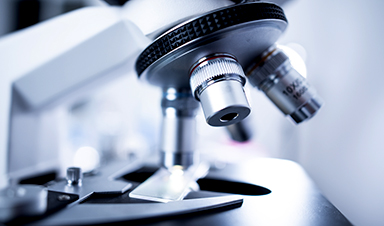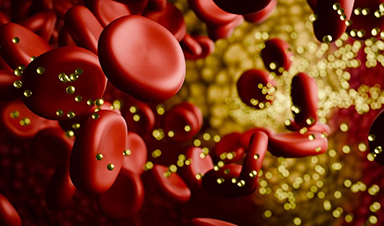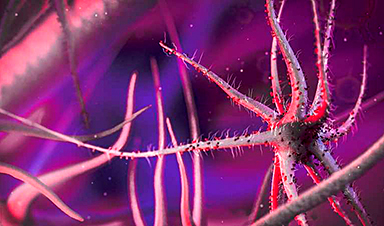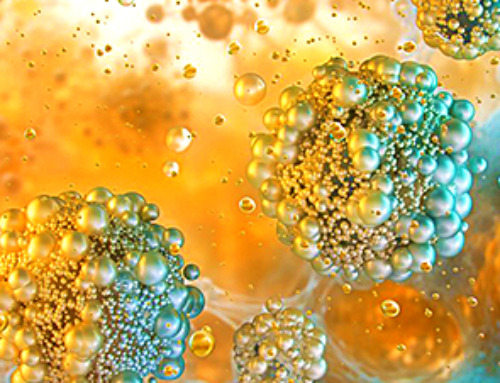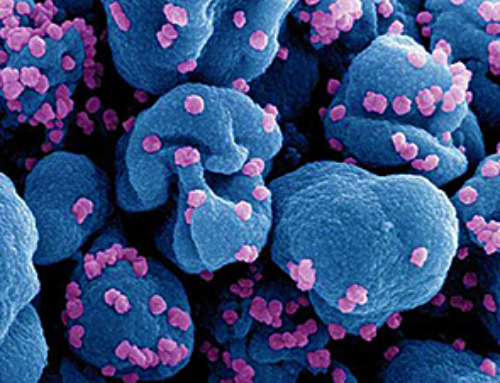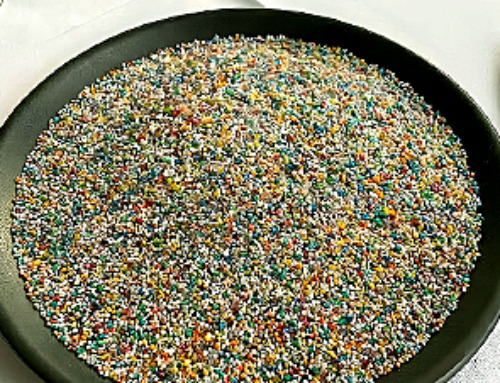WEHI researchers are studying ‘nanobodies’ – tiny immune proteins made by alpacas—in a bid to understand whether they might be effective in blocking SARS-CoV-2, the virus that causes COVID-19.
Alpacas produce unique antibodies—called nanobodies—that can bind very specifically to a protein. The research team are developing nanobodies specific for the SARS-CoV-2 ‘spike’ protein, which sticks out from the surface of the virus and allows the virus to bind and enter human cells.
The team hopes that developing nanobodies against the ‘spike’ protein could be an important step towards new antibody-based ‘biologics’ therapies to treat COVID-19.
This nanobody program against COVID-19 is part of a consortium-led effort that brings together the expertise of Victorian and Australian academic and industry leaders in infectious diseases and antibody therapeutics at WEHI, the Doherty Institute, CSL, Affinity Bio, CSIRO, the Burnet Institute and the Kirby Institute.
Antibodies are key infection-fighting proteins in our immune system. An important aspect of antibodies is that they bind tightly and specifically to another protein, said Associate Professor Wai-Hong Tham, who is leading the research at WEHI.
“Antibody-based therapies—or ‘biologics’—utilize this property of antibodies, harnessing an antibody that binds specifically to a protein involved in disease. In our case, we are looking to develop a therapy that binds to the SARS-CoV-2 virus’ ‘spike’ protein, which it uses to get into human cells. These antibodies could prevent the virus binding to the human receptor called ACE2—stopping the COVID-19 infection cycle,” she said.
A quirk of the alpaca immune system makes alpaca antibodies a key resource in this project.
“Alpacas make unique antibodies, which are smaller than conventional antibodies. Conventional antibodies are composed of two immunoglobin—heavy chains and light chains—whereas alpacas make the majority of antibodies that lack the light chains. Nanobodies are laboratory-made antibody fragments of the heavy chain only domain that recognizes foreign proteins. These bind really specifically to their target protein and are more stable than other antibodies,” Associate Professor Tham said.
Top Image Credit: phys.org
Post by Amanda Scott, NA CEO. Follow her on twitter @tantriclens
Thanks to Heinz V. Hoenen. Follow him on twitter: @HeinzVHoenen
News
Platelet-inspired nanoparticles could improve treatment of inflammatory diseases
Scientists have developed platelet-inspired nanoparticles that deliver anti-inflammatory drugs directly to brain-computer interface implants, doubling their effectiveness. Scientists have found a way to improve the performance of brain-computer interface (BCI) electrodes by delivering anti-inflammatory drugs directly [...]
After 150 years, a new chapter in cancer therapy is finally beginning
For decades, researchers have been looking for ways to destroy cancer cells in a targeted manner without further weakening the body. But for many patients whose immune system is severely impaired by chemotherapy or radiation, [...]
Older chemical libraries show promise for fighting resistant strains of COVID-19 virus
SARS‑CoV‑2, the virus that causes COVID-19, continues to mutate, with some newer strains becoming less responsive to current antiviral treatments like Paxlovid. Now, University of California San Diego scientists and an international team of [...]
Lower doses of immunotherapy for skin cancer give better results, study suggests
According to a new study, lower doses of approved immunotherapy for malignant melanoma can give better results against tumors, while reducing side effects. This is reported by researchers at Karolinska Institutet in the Journal of the National [...]
Researchers highlight five pathways through which microplastics can harm the brain
Microplastics could be fueling neurodegenerative diseases like Alzheimer's and Parkinson's, with a new study highlighting five ways microplastics can trigger inflammation and damage in the brain. More than 57 million people live with dementia, [...]
Tiny Metal Nanodots Obliterate Cancer Cells While Largely Sparing Healthy Tissue
Scientists have developed tiny metal-oxide particles that push cancer cells past their stress limits while sparing healthy tissue. An international team led by RMIT University has developed tiny particles called nanodots, crafted from a metallic compound, [...]
Gold Nanoclusters Could Supercharge Quantum Computers
Researchers found that gold “super atoms” can behave like the atoms in top-tier quantum systems—only far easier to scale. These tiny clusters can be customized at the molecular level, offering a powerful, tunable foundation [...]
A single shot of HPV vaccine may be enough to fight cervical cancer, study finds
WASHINGTON -- A single HPV vaccination appears just as effective as two doses at preventing the viral infection that causes cervical cancer, researchers reported Wednesday. HPV, or human papillomavirus, is very common and spread [...]
New technique overcomes technological barrier in 3D brain imaging
Scientists at the Swiss Light Source SLS have succeeded in mapping a piece of brain tissue in 3D at unprecedented resolution using X-rays, non-destructively. The breakthrough overcomes a long-standing technological barrier that had limited [...]
Scientists Uncover Hidden Blood Pattern in Long COVID
Researchers found persistent microclot and NET structures in Long COVID blood that may explain long-lasting symptoms. Researchers examining Long COVID have identified a structural connection between circulating microclots and neutrophil extracellular traps (NETs). The [...]
This Cellular Trick Helps Cancer Spread, but Could Also Stop It
Groups of normal cbiells can sense far into their surroundings, helping explain cancer cell migration. Understanding this ability could lead to new ways to limit tumor spread. The tale of the princess and the [...]
New mRNA therapy targets drug-resistant pneumonia
Bacteria that multiply on surfaces are a major headache in health care when they gain a foothold on, for example, implants or in catheters. Researchers at Chalmers University of Technology in Sweden have found [...]
Current Heart Health Guidelines Are Failing To Catch a Deadly Genetic Killer
New research reveals that standard screening misses most people with a common inherited cholesterol disorder. A Mayo Clinic study reports that current genetic screening guidelines overlook most people who have familial hypercholesterolemia, an inherited disorder that [...]
Scientists Identify the Evolutionary “Purpose” of Consciousness
Summary: Researchers at Ruhr University Bochum explore why consciousness evolved and why different species developed it in distinct ways. By comparing humans with birds, they show that complex awareness may arise through different neural architectures yet [...]
Novel mRNA therapy curbs antibiotic-resistant infections in preclinical lung models
Researchers at the Icahn School of Medicine at Mount Sinai and collaborators have reported early success with a novel mRNA-based therapy designed to combat antibiotic-resistant bacteria. The findings, published in Nature Biotechnology, show that in [...]
New skin-permeable polymer delivers insulin without needles
A breakthrough zwitterionic polymer slips through the skin’s toughest barriers, carrying insulin deep into tissue and normalizing blood sugar, offering patients a painless alternative to daily injections. A recent study published in the journal Nature examines [...]
